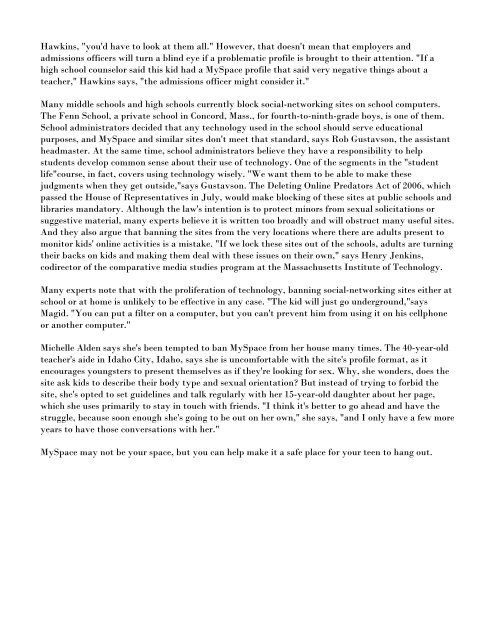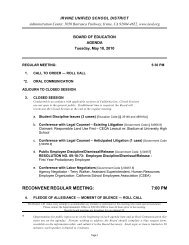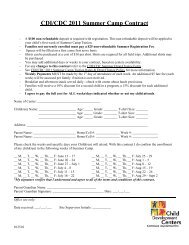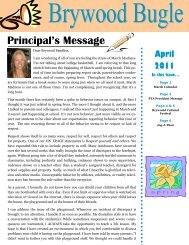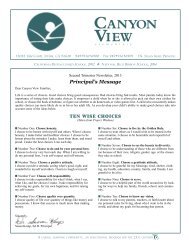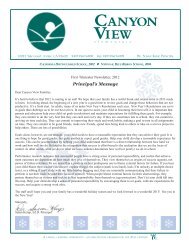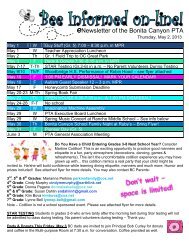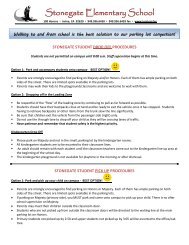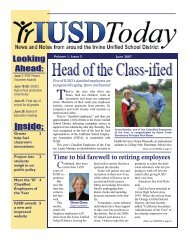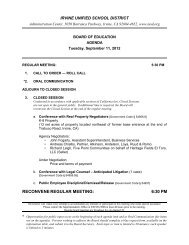You also want an ePaper? Increase the reach of your titles
YUMPU automatically turns print PDFs into web optimized ePapers that Google loves.
Hawkins, "you'd have to look at them all." However, that doesn't mean that employers and<br />
admissions officers will turn a blind eye if a problematic profile is brought to their attention. "If a<br />
high school counselor said this kid had a <strong>MySpace</strong> profile that said very negative things about a<br />
teacher," Hawkins says, "the admissions officer might consider it."<br />
Many middle schools and high schools currently block social-networking sites on school computers.<br />
The Fenn School, a private school in Concord, Mass., for fourth-to-ninth-grade boys, is one of them.<br />
School administrators decided that any technology used in the school should serve educational<br />
purposes, and <strong>MySpace</strong> and similar sites don't meet that standard, says Rob Gustavson, the assistant<br />
headmaster. At the same time, school administrators believe they have a responsibility to help<br />
students develop common sense about their use of technology. One of the segments in the "student<br />
life"course, in fact, covers using technology wisely. "We want them to be able to make these<br />
judgments when they get outside,"says Gustavson. The Deleting Online Predators Act of 2006, which<br />
passed the House of Representatives in July, would make blocking of these sites at public schools and<br />
libraries mandatory. Although the law's intention is to protect minors from sexual solicitations or<br />
suggestive material, many experts believe it is written too broadly and will obstruct many useful sites.<br />
And they also argue that banning the sites from the very locations where there are adults present to<br />
monitor kids' online activities is a mistake. "If we lock these sites out of the schools, adults are turning<br />
their backs on kids and making them deal with these issues on their own," says Henry Jenkins,<br />
codirector of the comparative media studies program at the Massachusetts Institute of Technology.<br />
Many experts note that with the proliferation of technology, banning social-networking sites either at<br />
school or at home is unlikely to be effective in any case. "The kid will just go underground,"says<br />
Magid. "You can put a filter on a computer, but you can't prevent him from using it on his cellphone<br />
or another computer."<br />
Michelle Alden says she's been tempted to ban <strong>MySpace</strong> from her house many times. The 40-year-old<br />
teacher's aide in Idaho City, Idaho, says she is uncomfortable with the site's profile format, as it<br />
encourages youngsters to present themselves as if they're looking for sex. Why, she wonders, does the<br />
site ask kids to describe their body type and sexual orientation? But instead of trying to forbid the<br />
site, she's opted to set guidelines and talk regularly with her 15-year-old daughter about her page,<br />
which she uses primarily to stay in touch with friends. "I think it's better to go ahead and have the<br />
struggle, because soon enough she's going to be out on her own," she says, "and I only have a few more<br />
years to have those conversations with her."<br />
<strong>MySpace</strong> may not be your space, but you can help make it a safe place for your teen to hang out.


